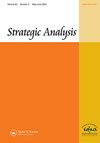India in the Emerging World Order
IF 0.5
Q3 INTERNATIONAL RELATIONS
引用次数: 0
Abstract
T he fact that bipolarity is passing and a new multipolar world structure has emerged, merits a deeper examination. In the political sphere, the interests of the super powers, collaborative or competitive, do influence the existing international order. At the level of avoiding mutual conflict or ensuring peace in Europe, the super powers have taken many steps to reduce tension. But their competition for dominance of the Third World continues. Their influence is particularly evident in conflict situations obtaining, for instance, in Southern Africa and West Asia. At the strategic level, the super powers far outdistance other nuclear powers in numbers and sophistication of their weaponry—both nuclear and conventional. Not merely that. The obtaining level of their military research permits their retaining this lead, and increasing it in future. A caveat might be entered here. The development of entirely new types of weapons like cruise missiles or laser devices by other countries may alter defensive and offensive capabilities radically. Still, it is doubtful, whether, other nuclear weapons countries could successfully contend with the super powers at the military level. And yet, one might pause to reflect if military superiority is today of cardinal importance. It does not appear to be readily translatable into political power. Take the case of the super powers. The United States was singularly unsuccessful in its Vietnam intervention, although it utilized the most sophisticated conventional weaponry in the American arsenal over a prolonged period. Quite obviously, the forces of Vietnamese nationalism and political will succeeded when pitted against superior military technology. In West Asia, political influence has see-sawed between the super powers. The Arab-Israeli war of 1973 obtained for the Arabs a political, though not a military victory through their adroit use of the oil weapon. Soviet influence, used on the side of the Arabs, stood at its acme. But the Kissinger diplomacy successfully re-established American influence, thereby eroding the Soviet advantage. Again in Angola, the United States, paralysed by the Vietnam and Watergate disclosures, was unable to achieve its objectives. The Soviet Union appears poised to consolidate its political gains in Southern Africa新兴世界秩序中的印度
双极性正在过去,一个新的多极世界结构已经出现,这一事实值得深入研究。在政治领域,超级大国的利益,无论是合作还是竞争,都会影响现有的国际秩序。在避免相互冲突或确保欧洲和平的层面上,超级大国采取了许多措施来缓解紧张局势。但他们争夺第三世界主导地位的竞争仍在继续。它们的影响在冲突局势中尤其明显,例如在南部非洲和西亚。在战略层面,超级大国在核武器和常规武器的数量和先进程度上远远超过其他核大国。不仅如此。他们的军事研究水平使他们能够保持这种领先地位,并在未来不断提高。此处可能会输入警告。其他国家开发巡航导弹或激光装置等全新武器可能会从根本上改变防御和进攻能力。尽管如此,其他核武器国家能否在军事层面成功地与超级大国抗衡仍令人怀疑。然而,人们可能会停下来思考军事优势在今天是否至关重要。它似乎不容易转化为政治权力。以超级大国为例。美国对越南的干预非常失败,尽管它在很长一段时间内使用了美国武器库中最先进的常规武器。很明显,越南民族主义和政治意愿的力量在与优越的军事技术对抗时取得了成功。在西亚,政治影响力在超级大国之间摇摆不定。1973年的阿以战争为阿拉伯人赢得了一场政治胜利,尽管不是通过他们熟练使用石油武器取得的军事胜利。苏联对阿拉伯人的影响达到了极致。但基辛格外交成功地重新确立了美国的影响力,从而削弱了苏联的优势。在安哥拉,由于越南事件和水门事件的曝光,美国陷入瘫痪,无法实现其目标。苏联似乎准备巩固其在南部非洲的政治成果
本文章由计算机程序翻译,如有差异,请以英文原文为准。
求助全文
约1分钟内获得全文
求助全文

 求助内容:
求助内容: 应助结果提醒方式:
应助结果提醒方式:


